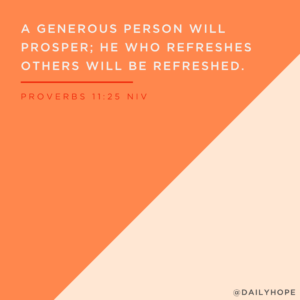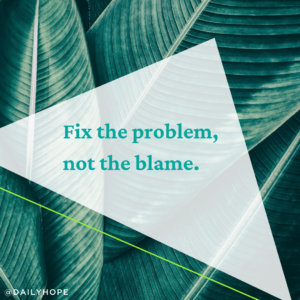Rick Warren's Blog, page 302
May 22, 2021
Unpack Your Emotional Baggage Before Marriage

“In the end, people appreciate honest criticism far more than flattery.”
Proverbs 28:23 (NLT)
Before you start dating someone, it’s crucial that you make an honest assessment of your own emotional health and that of your potential partner.
I remember marrying a couple many years ago at Saddleback. About five years later, my wife, Kay, and I had them over for dinner. The woman told me, “When I walked down the aisle in that white dress, I had no idea that I was carrying an entire bag of emotional garbage on my back. And I took all that garbage into the marriage.”
Marriage does not create problems. It reveals them. The more you can deal with emotional problems before you get married, the happier, more God-honoring, and more fulfilling your marriage is going to be.
Start with yourself. Don’t date unless your own emotional hurts are healed—or at least in the healing process. Do you struggle with bitterness or anger problems? Work through those before you start dating. Get rid of your own emotional baggage.
Then, when you begin dating someone, size that person up quickly, particularly related to their emotional health. Don’t be afraid to ask questions like, “Do you have uncontrolled anger?” “Can we talk about me?” or “Will you pick up the tab?”
If you see warning signs of unresolved emotional difficulties, don’t wait around to see if it gets better. Go ahead and walk away.
Maybe you’re already in a dating relationship and you now see the signs of emotional unhealth in your partner. If so, talk with your partner about it. It’s either time to get professional counseling or it may be time to end the relationship.
“But I won’t have anybody to go out with on Friday night,” you say. Here’s the truth: A bad marriage is a million times worse than not going out on Friday night! And the longer you stay in a dead-end relationship, the more difficult it is to get out of it.
Proverbs 28:23 says, “In the end, people appreciate honest criticism far more than flattery” (NLT).
No matter how much it hurts, be honest with yourself and your partner today. In the end, you both will benefit from it.
There’s one more thing I want you to hear: To have the best chance at a strong relationship, you and your potential partner need to have a personal relationship with Jesus. If you haven’t taken that step, start there. Making peace with God will give you the spiritual foundation you need to get emotionally healthy and make peace with yourself and others too.
Life has no guarantees, but two emotionally healthy followers of Jesus have the strong foundation they need to build a marriage of deep soul intimacy—intimacy that is personal, relational, sexual, and spiritual.
PLAY today’s audio teaching from Pastor Rick >>Talk It Over
If you’re dating someone, have you taken an honest look at their emotional health? What hard questions do you need to ask them today?
Take a few minutes to assess your own emotional health. What emotional baggage are you carrying around?
Think of an emotionally healthy couple in your life. What can you learn from them?
The post Unpack Your Emotional Baggage Before Marriage appeared first on Pastor Rick's Daily Hope.
May 21, 2021
¿Cómo tu Decisión Afectará a Otros?

“Así que cada uno de nosotros tendrá que rendirle cuentas a Dios. Por eso, dejemos de criticarnos unos a otros. Mejor tratemos de no hacer nada que pueda perjudicar la fe de nuestro hermano o llevarlo a cometer pecados”. Romanos 14:12-13 (PDT)
Uno de los mayores errores que cometemos en la vida es olvidar lo mucho que nuestras acciones influyen a las personas que nos rodean. Cada día eres tentado a tomar decisiones que pueden ser lo mejor para ti, pero que podrían tener un efecto devastador en las personas que te rodean. Si quieres tomar decisiones sabias, debes preguntarte: “¿De alguna forma mi decisión afectará a otras personas?”.
Esto es exactamente lo contrario a nuestra cultura. Nuestra cultura nos enseña a pensar sólo en nosotros mismos. Pero Dios quiere que pienses en los demás, no sólo en ti mismo. De hecho, la Biblia dice que un día Dios te juzgará por la forma en que tus decisiones afectaron a los demás.
Romanos 14:12-13 dice: “Así que cada uno de nosotros tendrá que rendirle cuentas a Dios. Por eso, dejemos de criticarnos unos a otros. Mejor tratemos de no hacer nada que pueda perjudicar la fe de nuestro hermano o llevarlo a cometer pecados” (PDT).
Puede que no te guste escuchar esto, pero te guste o no, tú estás siendo observado todo el tiempo. Si eres un padre, deberías estar especialmente atento a esos pequeños ojos que te miran. Tienes que ser cuidadoso con lo que dices y haces porque no solamente estás influenciando tu propia vida sino también la próxima generación.
Muestra respeto por la autoridad. Si un policía te detiene por una infracción de tránsito, aun si piensas que está equivocado, trátalo respetuosamente.
No te reportes enfermo al trabajo, cuando en realidad tomaste el día para ir a la playa con tu familia.
No lleves a tu casa artículos de la oficina para ser usados para beneficio personal.
No presumas delante de tus hijos por la manera en que pagas menos impuestos.
Ni veas las cosas horribles que hay en la televisión y en las películas con tus hijos. Piensa si en realidad tú mismo deberías ver esas cosas.
Las personas maduras limitan su libertad por el beneficio de los demás. ¿Lo haces porque temes lo que los demás van a pensar? Por supuesto que no, lo haces por amor. En situaciones donde claramente no hay ni bueno ni malo, debes preguntarte a ti mismo: “¿De qué manera mi decisión afectará a los demás?”.
Reflexiona sobre esto:
¿De qué forma el orgullo aparece cuando consideras que tus decisiones pueden afectar a los demás?¿Importa si la otra persona piensa que lo que tú estás haciendo está mal aunque tú pienses que está bien? ¿Por qué sí o por qué no?¿Qué significa limitar tu libertad por el beneficio de los demás?Síguenos en nuestra cuenta de Instagram: @esperanzadiariadelpastorrickThe post ¿Cómo tu Decisión Afectará a Otros? appeared first on Pastor Rick's Daily Hope.
Let God Guide Your Choices

“Can two people walk together without agreeing on the direction?”
Amos 3:3 (NLT)
If you wait for the perfect wife or the perfect husband, you’ll never find them. Let me tell you why: No one is perfect. We’re all broken.
And that’s okay. God loves you, despite your brokenness. But you need to understand that anyone you marry will be broken too.
Here’s where you need to be careful. Although everyone is broken, some people have a lot more healing to do. They aren’t ready for a relationship. And you need to avoid them as life partners no matter how good-looking, rich, or nice they are.
Before you enter into a long-term relationship, you need to understand the emotional health of your potential partner. Study after study has shown that 80 percent of all separations and divorces happen because one or both of the partners are emotionally unhealthy.
Here’s a partial checklist of emotional health factors, drawn from Scripture, to look out for:
Whoever you marry must not be nursing uncontrolled anger. Proverbs 22:24 says, “Do not make friends with a hot-tempered person, do not associate with one easily angered” (NIV). Uncontrolled anger reveals deep insecurity and low self-worth.
Whoever you marry must not be stuck in an addiction. Proverbs 23:20 says, “Don’t associate with people who drink too much wine or stuff themselves with food” (GNT). Only two things—food and alcohol—are mentioned here, but there are hundreds of ways to get addicted.
Whoever you marry must not be harboring bitterness. Bitterness is like a poison. It eats you alive. The Bible says in Hebrews 12:15, “Guard against turning back from the grace of God. Let no one become like a bitter plant that grows up and causes many troubles with its poison” (GNT).
Whoever you marry must not be selfish. Proverbs 28:25 says, “Selfishness only causes trouble” (GNT). When it comes down to it, the number one cause of conflict in marriage is selfishness.
Whoever you marry must not be greedy. Proverbs 15:27 says, “Greed brings grief to the whole family” (NLT). If you marry a greedy spouse, you will be in debt your entire life.
Whoever you marry must be generous and kind. The Bible says, “A generous person will prosper; he who refreshes others will be refreshed” (Proverbs 11:25 NIV). It also says, “Those who are kind benefit themselves, but the cruel bring ruin on themselves” (Proverbs 11:17 NIV).
Whoever you marry must tell the truth. Proverbs 20:7 says this: “A righteous person lives on the basis of his integrity. Blessed are his children after he is gone” (GW). Love is based on trust, and trust is based on truth. If you don’t tell me the truth, I can’t trust you. And if I can’t trust you, how can I love you?
You might be thinking, “This sure is a long list, Rick. I’m not sure if I’ll ever find anybody who fits this.” But I did. And you can too.
When Kay and I got married, Leonard Ravenhill, the great 20th century evangelist and author, sent us a wedding card. I’ve never forgotten what it said: “God always gives his best to those who follow his wisdom.”
And God will give you his best as you seek his guidance and follow him in obedience. “Do not be afraid or discouraged, for the LORD will personally go ahead of you. He will be with you; he will neither fail you nor abandon you” (Deuteronomy 31:8 NLT)
PLAY today’s audio teaching from Pastor Rick >>Talk It Over
Have you been expecting perfection out of potential life partners or from your close friends and family? How does knowing we’re all broken change your expectations of others?
How have you seen God bring emotional health to you or someone you know?
Did you see yourself in any of the unhealthy emotional traits in today’s Daily Hope? If you did, what’s one step you’ll take today to seek God’s healing?
The post Let God Guide Your Choices appeared first on Pastor Rick's Daily Hope.
May 20, 2021
Decídete por lo Mejor

“«Todo está permitido», pero no todo es provechoso. «Todo está permitido», pero no todo es constructivo”. 1 Corintios 10:23 (NVI)
Algunas cosas no son necesariamente malas; simplemente no son necesarias. La mayoría de las decisiones que tú tomas en la vida no son en realidad un conflicto entre lo bueno y lo malo. Es más un asunto de lo que es mejor para ti.
La Biblia habla de esto en 1 Corintios 10:23, “«Todo está permitido», pero no todo es provechoso. «Todo está permitido», pero no todo es constructivo” (NVI).
Muchas cosas son neutras moralmente. Para tomar una buena decisión debes ir a un estándar más alto y preguntar: “¿Esto qué voy a hacer me hará una mejor persona?”.
Recuerdo hace muchos años atrás, cuando Kay amamantaba a nuestros bebés, que siempre estaban hambrientos alrededor del mediodía, de tal forma que ella podía sentarse a alimentarlos y prender la televisión. ¿Qué hay en la TV al mediodía? Novelas. Entonces, ella comenzó a ver una novela mientras alimentaba a los bebés. Las novelas van una tras otra: una lleva directo a la siguiente. Muy pronto ella ya estaba viendo dos. Después de un tiempo, tres. ¡Y los bebés estaban engordando!
Tras un tiempo, ella dijo que se había dado cuenta de que no fijaba la hora por los bebés. En la práctica estaba reordenando su agenda diaria para asegurarse de que podría ver esos programas. Ella comenzó a pensar: “Voy a planchar ahora mismo”, o “Voy a limpiar la cocina”, y se aseguraba de hacerlo dondequiera que estaba el televisor.
De repente se había conectado a la vida de personas ficticias. ¡Llegó a interesarse íntimamente en la vida de personas que ni siquiera existían! Entonces, un día sintió que algo la golpeó como una tonelada de ladrillos: “¡Estoy desperdiciando mi vida! Esto no me hace una mejor mujer o madre o esposa. No añade ningún valor a mi vida. Sería mejor interesarme en personas que sí existen”.
¿Estás más interesado en personajes ficticios de la televisión que en Pablo, Pedro y los discípulos, y en lo que Dios quiere hacer en tu vida? ¿Inviertes tu tiempo en las vidas superficiales de la gente que aparecen en las revistas de celebridades? ¿Estás pegado a tu canal deportivo favorito desde el momento que llegas a casa el viernes hasta la mañana del lunes?
¿Son perversas esas cosas? No. ¿Son malas? No. Pero la pregunta no es: “¿Hay algo malo en ello?” La pregunta es: “¿Me hará esto más como Jesús?”.
Reflexiona sobre esto:
¿Cuáles son las cosas que haces o los hábitos que tienes, que no son malos, pero que no son lo mejor que Dios tiene para ti?¿Con qué cosas puedes reemplazar las cosas o los hábitos, para que te ayuden a crecer como un seguidor de Cristo?¿Piensas que decidir lo mejor es lo mismo que te hace un mejor creyente?Síguenos en nuestra cuenta de Instagram: @esperanzadiariadelpastorrickThe post Decídete por lo Mejor appeared first on Pastor Rick's Daily Hope.
Choose Your Partner Carefully
“The righteous choose their friends carefully.”
Proverbs 12:26 (NIV)
If you’re supposed to choose your friends carefully, you should be even more careful about choosing your life partner. And notice that you do get to choose. God leads, guides, and gives you guidelines. But ultimately, who you marry—and whether you marry—is your choice.
However, many people believe the myth that there is only one right person for them.
That’s very romantic, but it’s just not true. It’s not biblical, and it’s not even logical! If there were only one right person for each person in the world, one person making a wrong decision would break the chain for everybody else.
Let’s say I’m supposed to marry a woman named Susan. Instead, I marry Kay. So then, Susan might marry somebody else, who was supposed to marry somebody else, who was supposed to marry another person! Do you see how the apple cart is upset for everyone on the entire planet?
There are many people God would want you not to marry. But there likely are quite a few other options that could fall within his will for your life. And in those cases, it’s your choice. You can follow your preference.
There’s another myth that many people believe: Love alone is reason enough to marry.
I frequently talk with people who are planning to get married. And sometimes I look at them and think, “There’s no way.” The family background, spiritual foundation, or personalities aren’t right. They don’t have the same amount of energy or ambition. They don’t even have the same values and goals. But they “love each other.”
Loving someone does not mean you should marry that person.
God may not tell you who to marry. But he does give you principles that will help you make a wise decision. In tomorrow’s Daily Hope devotional, we’ll go over a list of traits to avoid in potential partners.
There are few better gifts in life than a good spouse. Relying on God’s guidance can help you make a wise decision.
PLAY today’s audio teaching from Pastor Rick >>Talk It Over
Have you believed the myth that there’s only one right potential life partner for each of us? How does it make you feel to know God gives people a choice?
When have you seen friends or family marry just for love when they really weren’t compatible? What have you learned from them?
When have you seen friends or family wisely choose a life partner? What have you learned from them?
The post Choose Your Partner Carefully appeared first on Pastor Rick's Daily Hope.
May 19, 2021
¿Qué Sucede cuando Haces lo que Sabes que está Mal?
“Quien se conduce con integridad, anda seguro; quien anda en malos pasos será descubierto”. Proverbios 10:9 (NVI)
La Biblia dice en Proverbios 10:9, “Quien se conduce con integridad, anda seguro; quien anda en malos pasos será descubierto” Proverbios 10:9 (NVI). ¡Serás descubierto! Así que cuando tomes decisiones, tienes que lograr la prueba de integridad.
La prueba de integridad es que tu vida pública y tu vida privada sean iguales, lo que está en tu corazón y lo que es tu vida son la misma cosa. Hazte esta pregunta: “¿Me gustaría que todo el mundo sepa acerca de esta decisión que estoy tomando?” La verdad es que cuando se trata de integridad, aunque puedas engañar a todo el mundo, no te puedes engañar a ti mismo. Y si violas tu propia conciencia, tienes que pagar por ello.
A veces sabemos que estamos a punto de hacer las cosas mal. Sabemos que no debemos hacerlo, pero este pensamiento viene a nuestra mente: “Yo sé que estoy haciendo las cosas mal, pero voy a seguir adelante y hacerlo porque sé que Dios es un Dios que perdona”.
¿Qué clase de tonto crees que es Dios? ¿Crees que puedes hacer algo que Él dice que está mal y que no tendrá consecuencias en tu vida? Esa es la verdadera razón por la que Él no quiere que tomes esa decisión, porque te ama y no porque quiera impedir que te diviertas. Él sabe que hay consecuencias para cada decisión. Él sabe que cada mala decisión deja cicatrices en tu vida. Y quiere lo mejor para ti.
¿Significa esto que Dios no nos perdona por las cosas malas que hacemos? Por supuesto que nos perdona. Él es un Dios perdonador y misericordioso. Pero el perdón no nos libera del dolor ni de las consecuencias que vienen por las malas decisiones. Puedes ser perdonado y todavía tener remordimientos. Puedes ser perdonado y todavía enfrentar el dolor. Puedes ser perdonado y aun así tener una relación destruida. Puedes ser perdonado y aun así perder recompensas.
Romanos 14:14 dice: “pero si alguien piensa que está mal…, entonces, para esa persona, está mal” (NTV). Este versículo simplemente dice que en caso de duda, no lo hagas. Es una violación de la prueba de integridad. Todo lo que no proviene de fe en nuestras vidas es pecado.
Reflexiona sobre esto:
¿Qué crees que Dios quiere que suceda en tu corazón cuando pides perdón?¿Cómo afecta tu integridad el saber lo que hay que hacer y no hacerlo?¿Por qué es tan peligroso el juego de la comparación cuando se trata de integridad? ¿Cómo se aplica Romanos14:14?Síguenos en nuestra cuenta de Instagram: @esperanzadiariadelpastorrickThe post ¿Qué Sucede cuando Haces lo que Sabes que está Mal? appeared first on Pastor Rick's Daily Hope.
Peace with People Follows Peace with God

“There is one God and one mediator between God and mankind, the man Christ Jesus.”
1 Timothy 2:5 (NIV)
When you have conflict, focus on reconciliation, not resolution.
There’s a big difference between those two words. Reconciliation means re-establishing the relationship. Resolution means resolving every issue.
In most cases, resolution isn’t going to happen—there are some things you’ll just never agree on.
Can you have a loving relationship without agreeing on everything? Absolutely. But it takes wisdom. When you’re wise, you learn to disagree without being disagreeable; you learn to walk hand in hand without having to see eye to eye.
One of the greatest things you can do with your life is be a bridge builder, not a wall builder. You are most like Jesus Christ when you are reconciling people. That’s exactly what Jesus came to do! God sent Jesus to Earth to reconcile humanity with God.
Jesus is the great reconciler. The Bible says, “There is one God and one mediator between God and mankind, the man Christ Jesus” (1 Timothy 2:5 NIV).
But you cannot make peace with other people until you make peace with God. If you find yourself in constant conflict, ask yourself whether you’ve made peace with God. You can make peace with God by repenting of your sins and dedicating your life to serving him (see the prayer below).
The Bible calls Jesus the Prince of Peace. Peace with God leads to peace with yourself, which leads to peace with others.
PLAY today’s audio teaching from Pastor Rick >>Talk It Over
Is there a relationship where you’ve been trying unsuccessfully for resolution? What step can you take toward reconciliation instead?
How have you been encouraged by a Christian who’s a bridge builder, not a wall builder?
Are you at peace with God? If not, what’s keeping you from making peace with him today?
How to Make Peace With God
You can make peace with God by repenting of your sins and dedicating your life to serving him. The Bible calls Jesus the Prince of Peace. Do you need to get peace in your heart by letting the Prince of Peace inside? If so, pray this today:
“Dear Jesus, I know that I can’t have peace with myself and others until I have peace with you. I don’t want my sin to separate me from you any longer. You have promised that if I believe in you, everything I’ve ever done wrong will be forgiven, I will learn the purpose of my life, and you will accept me into your eternal home in heaven one day.
“I confess my sin, and I believe you are my Savior. You have promised that if I confess my sin and trust you, I will be saved. I trust you when you say salvation comes by grace, through faith, and not by anything I do. I receive you into my life as my Lord. Today, I’m turning over every part of my life to your management.
“You are the Prince of Peace, and I ask you to bring your peace to my life and relationships. I want to live the way you created me to live and use the rest of my life to serve you instead of serving myself. I commit my life to you and ask you to save me and accept me into your family. In Jesus’ name I pray. Amen.”
If you just prayed to accept Jesus, please email me at Rick@PastorRick.com and let me know about it. I’d like to send you some free materials to help you start your journey with Jesus.
The post Peace with People Follows Peace with God appeared first on Pastor Rick's Daily Hope.
May 18, 2021
Las Buenas Decisiones Siempre van de Acuerdo con la Palabra de Dios

“ Tu palabra es una lámpara a mis pies; es una luz en mi sendero”. Salmo 119:105 (NVI)
Cuando necesitas tomar una decisión, la primera pregunta que debes hacerte es esta: “¿mi decisión está en armonía con la Palabra de Dios?”.
Tienes que decidir cuál va a ser la máxima autoridad en tu vida. Realmente se reduce a dos opciones: la Palabra de Dios o la del mundo. ¿Tus decisiones están basándose en lo que Dios dice o en lo que dicen otras personas?
Si basas tu vida en la opinión popular, siempre vas a estar fuera de moda, ya que cambia todos los días. Lo que estaba “de moda” ayer no está “de moda” hoy y lo que está “de moda” hoy no estará “de moda” mañana. Si basas tu vida en la cultura popular, la ética contemporánea, o las encuestas de opinión, no tienes principios por los cuales vivir. Son fundamentos variables.
Por otro lado, si basas tu vida en la Palabra de Dios, la verdad nunca cambia. La verdad es siempre la misma. Así que si Dios dice que algo estaba mal hace 10.000 años, también estaba mal hace 500 años, y está mal hoy, y estará mal dentro de 1.000 años a partir de hoy. No me importa lo que las encuestas de opinión o la ética contemporánea o los medios de comunicación dicen. Si Dios dice que está mal, está mal. Siempre ha sido así y siempre lo será. Si Dios dice que está bien, siempre va a estar bien. Eso es un fundamento firme.
Dios ha creado el universo con ciertas leyes físicas, morales y espirituales. Dios construyó el universo alrededor de estas leyes no porque es caprichoso, sino porque todas esas leyes son para tu beneficio. Cuando cooperas con los principios de este universo tienes éxito. Si rechazas, desobedeces, e ignoras los principios de Dios, tú eres el que sale lastimado. Nunca rompes las leyes de Dios, ellas te rompen a ti. Si subo a la cima de un edificio y salto, no voy a romper la ley de la gravedad, esa ley me rompe a mí. Lo mismo ocurre con las leyes morales y las leyes espirituales. No puedes burlarte de Dios y salirte con la tuya. Hay un ajuste de cuentas inevitable. Cada vez que violas los principios de Dios, te estás metiendo en problemas.
Con todo esto en mente, puedes estar seguro de tu decisión. Si Dios dice que está bien, entonces lo haces. Si Dios dice “no”, entonces no lo hagas.
“Tu palabra es una lámpara a mis pies; es una luz en mi sendero” Salmo 119:105 (NVI).
Reflexiona sobre esto:
¿De qué manera la sociedad trata de convencerte de que la verdad es subjetiva?¿Qué necesitas estar haciendo con el fin de conocer la Biblia lo suficientemente bien como para basar tus decisiones en ella?¿Cómo has experimentado la libertad cuando has obedecido las leyes y la dirección de Dios en tu vida?Síguenos en nuestra cuenta de Instagram: @esperanzadiariadelpastorrickThe post Las Buenas Decisiones Siempre van de Acuerdo con la Palabra de Dios appeared first on Pastor Rick's Daily Hope.
Fix the Problem, Not the Blame

“Now you must also rid yourselves of all such things as these: anger, rage, malice, slander, and filthy language from your lips.”
Colossians 3:8 (NIV)
You only have a certain amount of emotional energy. When you’re trying to resolve conflict, you can use that energy either to fix the blame or to fix the problem. You don’t have enough energy to do both. So you need to ask yourself what’s more important—to blame the other person or to resolve the conflict.
Choose to fix the problem, not the blame.
When it comes to solving problems, you should decide ahead of time that you’re going to fight fair. Within your marriage or family, set ground rules for words you’ll never use—words that serve as weapons of mass destruction.
During the Cold War, when Russia and the United States were at each other’s throats, the United States had thousands of intercontinental missiles—weapons of mass destruction—aimed at Russia. We could destroy the entire nation. Russia had thousands of intercontinental missiles aimed at us too.
But even at the worst, most tension-filled point in the Cold War, both sides still had enough sanity not to use those weapons. It’s been called the MAD strategy; if either side decided to use the weapons, the result would be “mutually assured destruction.” In effect, the countries were saying, “If you use yours, we’re going to use ours. We’ll destroy each other, and there won’t be any countries left.” So even when we were on opposite sides of an issue, we could at least agree not to use those weapons.
Relationships often have weapons of mass destruction too. When you use those weapons, you fix blame—but you never fix problems. In marriages, for example, those weapons include things like threatening divorce or bringing up each other’s parents. You have to agree, no matter how upset you are, those words are off limits. Those are words of mutually assured destruction—they destroy a relationship by tearing down trust.
The Bible is very specific about what’s out of bounds in a relationship. Colossians 3:8 says, “Now you must also rid yourselves of all such things as these: anger, rage, malice, slander, and filthy language from your lips” (NIV).
Those are weapons of mass destruction. They’re used to fix blame. And when you fix blame, you’re judging—and only God has the right to judge.
Instead, set aside destructive weapons and use your energy for what matters. Fix the problem.
PLAY today’s audio teaching from Pastor Rick >>Talk It Over
What are the “weapons of mass destruction” in your relationships?
What practical steps can you take to stop fixing blame so that you can fix the problem instead?
Why is it important to set boundaries for “fighting fair” in a relationship?
The post Fix the Problem, Not the Blame appeared first on Pastor Rick's Daily Hope.
May 17, 2021
Para una buena Relación, Haz un Compromiso

“Se pasa bien compartiendo con los amigos, y un verdadero amigo es mejor que un hermano”. Proverbios 18:24 (PDT)
Las buenas relaciones no suceden por accidente. Hay que sembrarlas, trabajarlas, y darles mucho tiempo. ¡Eso requiere compromiso!
No puedo contar el número de veces que mi esposa Kay y yo tuvimos ganas de abandonar nuestro matrimonio, particularmente en los primeros años. Fueron muchas las veces que pensé, “Esto no vale la pena, somos tan diferentes, este matrimonio nunca va a funcionar”.
Pero nunca nos dejamos. ¿Por qué? Porque hicimos un compromiso. Hicimos votos –“Hasta que la muerte nos separe”- no sólo uno al otro sino con Dios. Así que dijimos, “Vamos a conservar este compromiso aunque nos mate”. ¡Y casi sucedió!
Hubo tiempos en nuestro matrimonio donde la única cosa que nos mantuvo juntos fueron esos votos –ni el amor, ni los intereses, sino simplemente el compromiso que hicimos ante Dios. Estoy tan contento de que no nos rendimos. Hoy, mi esposa es mi mejor amiga, y no me puedo imaginar mi vida sin ella.
La Biblia dice en Proverbios 18:24, “Se pasa bien compartiendo con los amigos, y un verdadero amigo es mejor que un hermano” (PDT).
¿Sabías que cuando socializas puedes perderte de relaciones más profundas? Puedes estar tan ocupado estableciendo, contactando, socializando y haciendo amistades que nunca tienes el tiempo ni la energía, para hacer el esfuerzo que se lleva cultivar la intimidad profunda, que satisface una buena amistad o en una buena relación conyugal.
No está mal tener muchos conocidos, pero te pueden mantener tan ocupado que no desarrollas ninguna relación cercana y vital. No necesitas muchos amigos para vivir en este mundo, solo unos pocos pero buenos. Necesitas enfocarte en la calidad, no en la cantidad. Tus conocidos —los cientos de “amigos” en Facebook y seguidores en Instagram— muy probablemente no van a estar ahí cuando los necesites. Sino que van a estar los amigos que están realmente conectados contigo y dispuestos a estar ahí cuando los necesites.
Cada conexión cercana e importante comienza con un compromiso. Si quieres ir más allá de una relación superficial, tienes que estar dispuesto a conservarla.
Reflexiona sobre esto:
¿Con quienes estás comprometido?¿Cómo tu red social evita que hagas conexiones más profundas con tus amigos, amigas y pareja?¿Cuál es un paso práctico que puedes tomar para tener, avanzar y profundizar en una relación?Síguenos en nuestra cuenta de Instagram: @esperanzadiariadelpastorrickThe post Para una buena Relación, Haz un Compromiso appeared first on Pastor Rick's Daily Hope.
Rick Warren's Blog
- Rick Warren's profile
- 2008 followers



